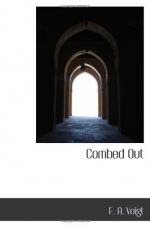The end of the war, no one could tell when that would be. But the next leave—it might come in eight or nine months—that was something to look forward to and I began to think of all the things I would do when it actually did come.
IX
ACROSS THE RIDGES
“And Cuchullain
... deemed it no honour nor deemed he it fair to
take horses or garments
or arms from corpses, or from the dead.”
(TAIN BO CUAILGNE, 5th Century).
There were only a few stars visible above, but the whole eastern horizon was flashing and scintillating. Down in the valley, where several British batteries were in action, long thin jets of flame darted forth incessantly.
As the day dawned we could see that the distant ridges were enveloped in drifts of dense, white fog. From time to time patches of the fog would glow redly and then become brilliantly incandescent and throw up sheets of lurid flame. German shells came whistling over and burst with angry, reverberating roars. Black fountains of earth and smoke spurted up from the fields and left slowly thinning clouds that hung suspended for a while and then dissolved in air. Sepia-coloured puffs appearing in the sky above were followed by sharp explosions and the rattle of descending shrapnel.
For several hours the tumult continued unabated and then the whistle of German shells became less frequent until at last it died down altogether.
Towards noon about a hundred German prisoners passed by under armed escort.
The ridges had been taken.
* * * * *
Our new camp lay at the foot of a gloomy hill. A disused trench ran right across it. Rifles, bayonets, bandoliers, grenades, water-bottles, packs, articles of clothing and bits of equipment lay scattered everywhere. Barbed wire rusted in coils or straggling lengths. Rusty tins and twisted, rusty sheets of shrapnel-riddled corrugated iron littered the sodden mud. Water, rust-stained or black and fetid, stagnated in pools and shell-holes. The sides of the trench were moist with iridescent slime. Dead soldiers lay everywhere with grey faces, grey hands and mouldering uniforms. Their pockets were turned inside out and mud-stained letters and postcards, and sometimes a mildewed pocket-book or a broken mirror, were dispersed round every rotting corpse. In front of my tent the white ribs of a horse projected from a heap of loose earth. Near by a boot with a human foot inside emerged from the black scummy water at the bottom of a shell-hole. An evil stench hovered in the air.
We buried all the dead that lay within the camp-lines. Then darkness descended and we crept into our tents.
We were lying on wet, oozy clay, thinly covered with wisps of soaked grass and decaying straw—there had been a cornfield here a year ago.
There were thirteen of us in one tent. We were wedged in tightly, shoulder to shoulder, our feet all in one bunch.




